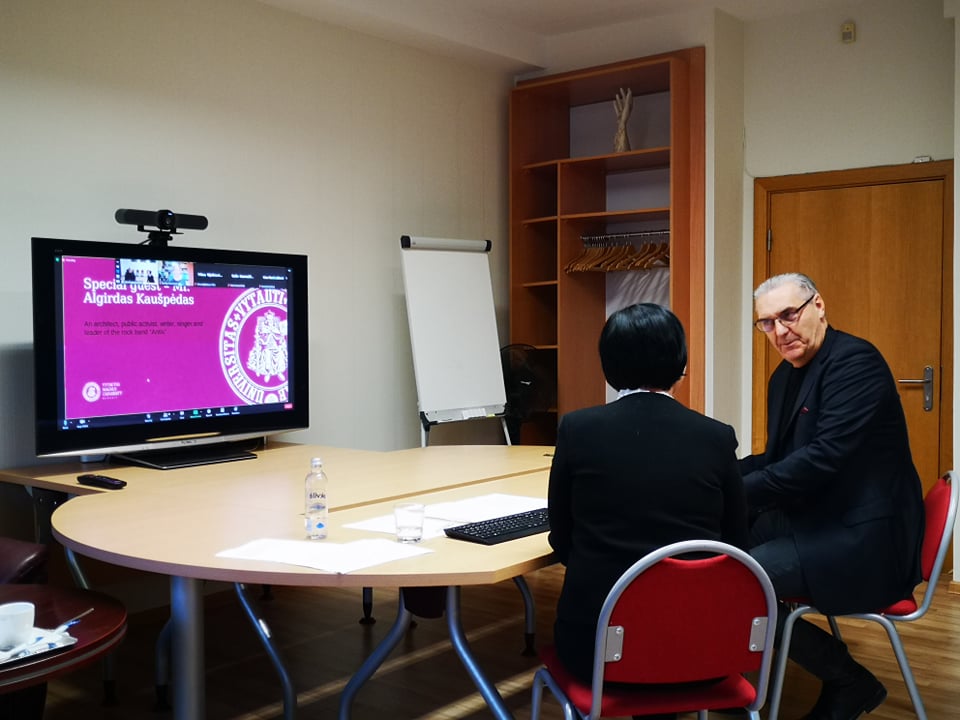We Must Be Prepared to Take Responsibility for Our Freedom

“The COVID-19 pandemic, increasingly aggressive totalitarian regimes and the global emigration caused by poverty and despair make us stop and think about our values. I believe that Freedom is one of the greatest values for any person. We have to talk about Freedom, learn Freedom, protect Freedom and enjoy Freedom again and again,” said Algirdas Kaušpėdas, writer, architect and leader of the legendary band Antis, during the opening of the VMU Lithuanian Language and Culture Winter Course.
Intelligent exercise of freedom
Lithuanian Language and Culture Courses have been organized at Vytautas Magnus University for 22 years now. For the past several years, the courses have been held both in-person and remotely in Kaunas and Vilnius. In January this year, the course will be held remotely and will be attended by over 70 participants from 13 different countries. During the courses, students not only learn the Lithuanian language, but also get acquainted with the history, culture and customs of our country. “We want to introduce foreigners to individuals that are of great importance to Lithuania. During the course we want to talk about Lithuanian history, freedom, partisans and state symbols. Therefore, during the opening of the Lithuanian Language and Culture Winter Course Algirdas Kaušpėdas delivered a lecture titled “Why Do We Need Freedom?”, during which he talked about his works and about Lithuania. “Algirdas Kaušpėdas is an eminent and inspiring figure, encouraging us to live critically and with a subtle grotesque in a free Lithuania,” says Vilma Leonavičienė, the course coordinator and Head of the Center for Lithuanian Studies and International Programs at VMU Education Academy.
The course is attended by students from Belarus, Ukraine, Sakartvelo, Azerbaijan and other countries, for whom the topic of freedom is important and relevant. During the lecture, Kaušpėdas stated that freedom is like a powerful element, like fire. The writer talked about responsibility and the experience of freedom. According to Kaušpėdas, it is important to develop the knowledge of exercising freedom in schools, families and universities – to improve, learn, integrate and cooperate.
“Responsibility is a conscious action, an intelligent exercise of freedom and leadership. Would you go ski-jumping if you couldn’t control the consequences of the jump? You really wouldn’t and neither would I. That’s also the case with freedom. We must be prepared to take responsibility for our freedom – to know how we will repay the credit of freedom. What is more, a bitter experience of irresponsible exercise of freedom can lead to fear of freedom. That is when a person begins to distrust his freedom of choice, seeks authority, control and leaders, and thus puts his or her freedom into the hands of others, abandons the desire for leadership and gradually becomes a slave or a zombie,” says Kaušpėdas.
Courses did not stop even during the pandemic
The Lithuanian Language and Culture Courses started during the pandemic proved that the time zone is not important for acquiring knowledge, and even a few thousand kilometers away, students can still establish links with Lithuania.
“We are happy that the number of students is increasing and that the geography is expanding. This year we have a lot of students from distant countries, such as Indonesia, Brazil, Argentina and Japan. I refer to students, who have no connection with our country, as seekers. After the course, many of these students fall in love with Lithuania, return here, and promote both our country and its language in their own countries. I call these people the strongest ambassadors and I am very proud of them. I understand those who have Lithuanian roots or scientific interest, but these students are special,” says Leonavičienė.
The history of the courses shows that many of these students decide to study in Lithuania, others settle here for several years, start a business or even translate books by Lithuanian authors into their own native languages. “For example, our long-standing course participant Aya Kimura has translated a number of Lithuanian books and recently participated in the European Literature Festival in Tokyo, where she talked about translating Lithuanian literature into Japanese. We are truly glad that we are gradually being recognized in countries such as Japan and Indonesia,” says course coordinator Leonavičienė.
You can watch the opening ceremony of the Lithuanian Language and Culture Winter Course here.
Lithuanian Language and Culture Winter Course is organized by VMU, VMU Education Academy, VMU Faculty of Humanities and Baltic Summer University.













